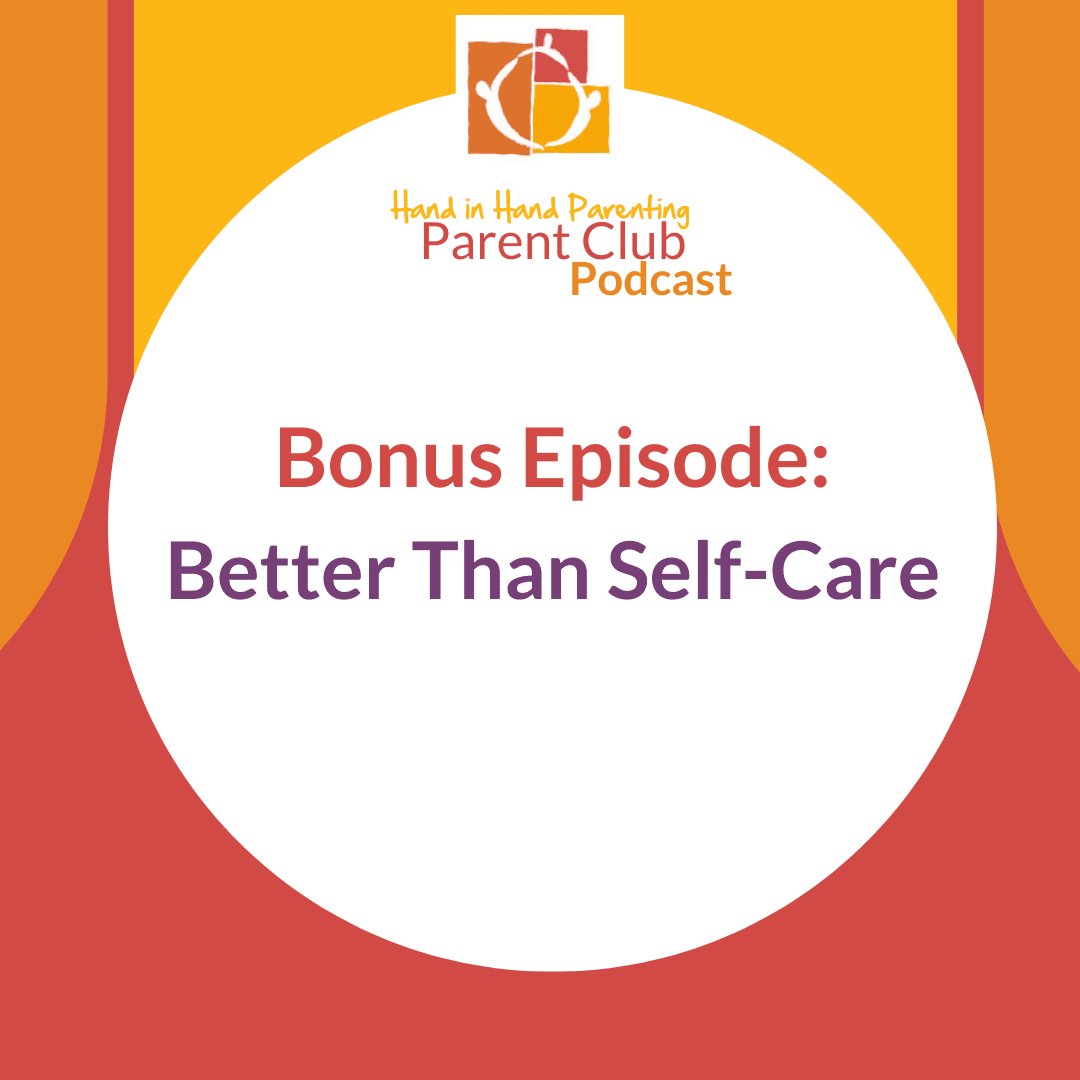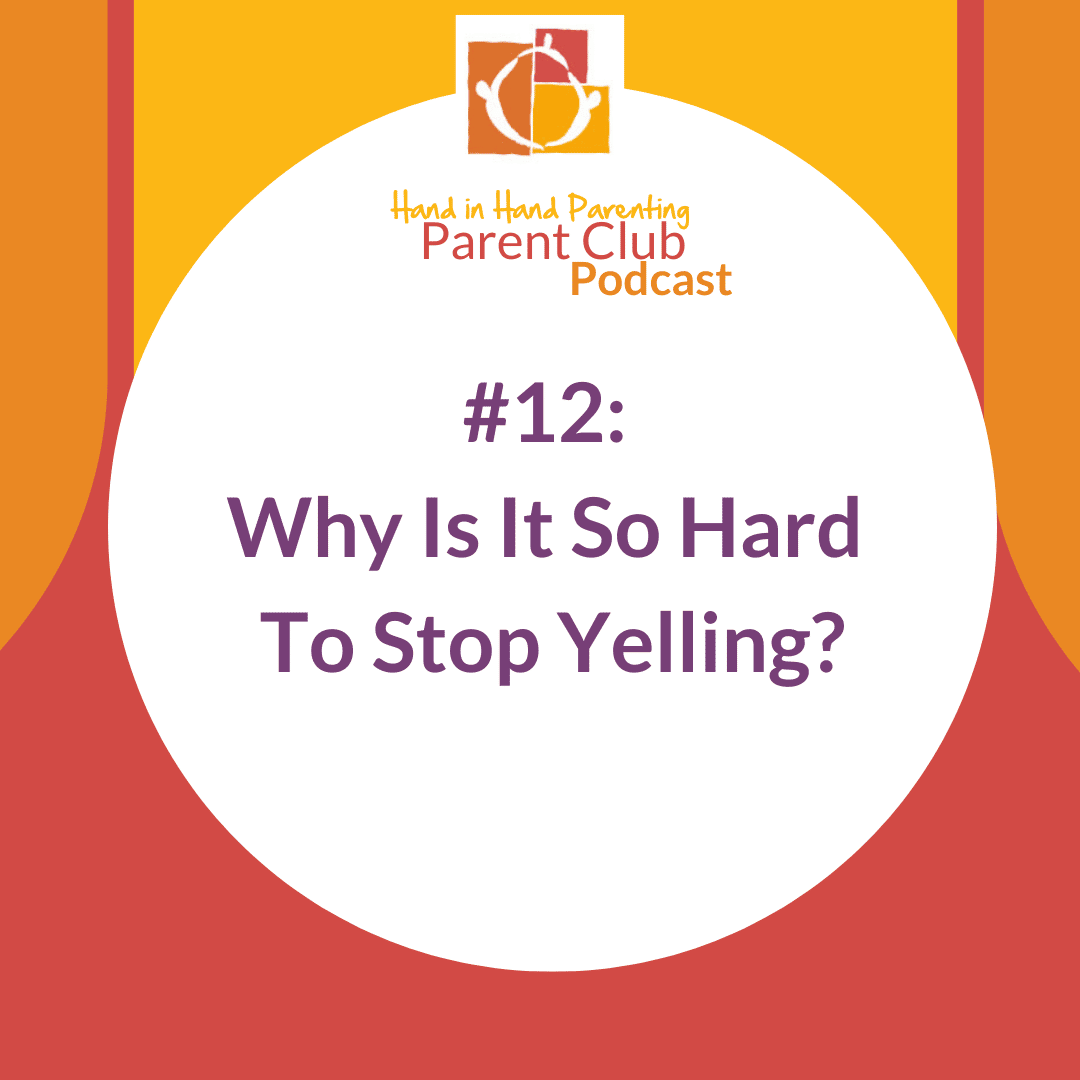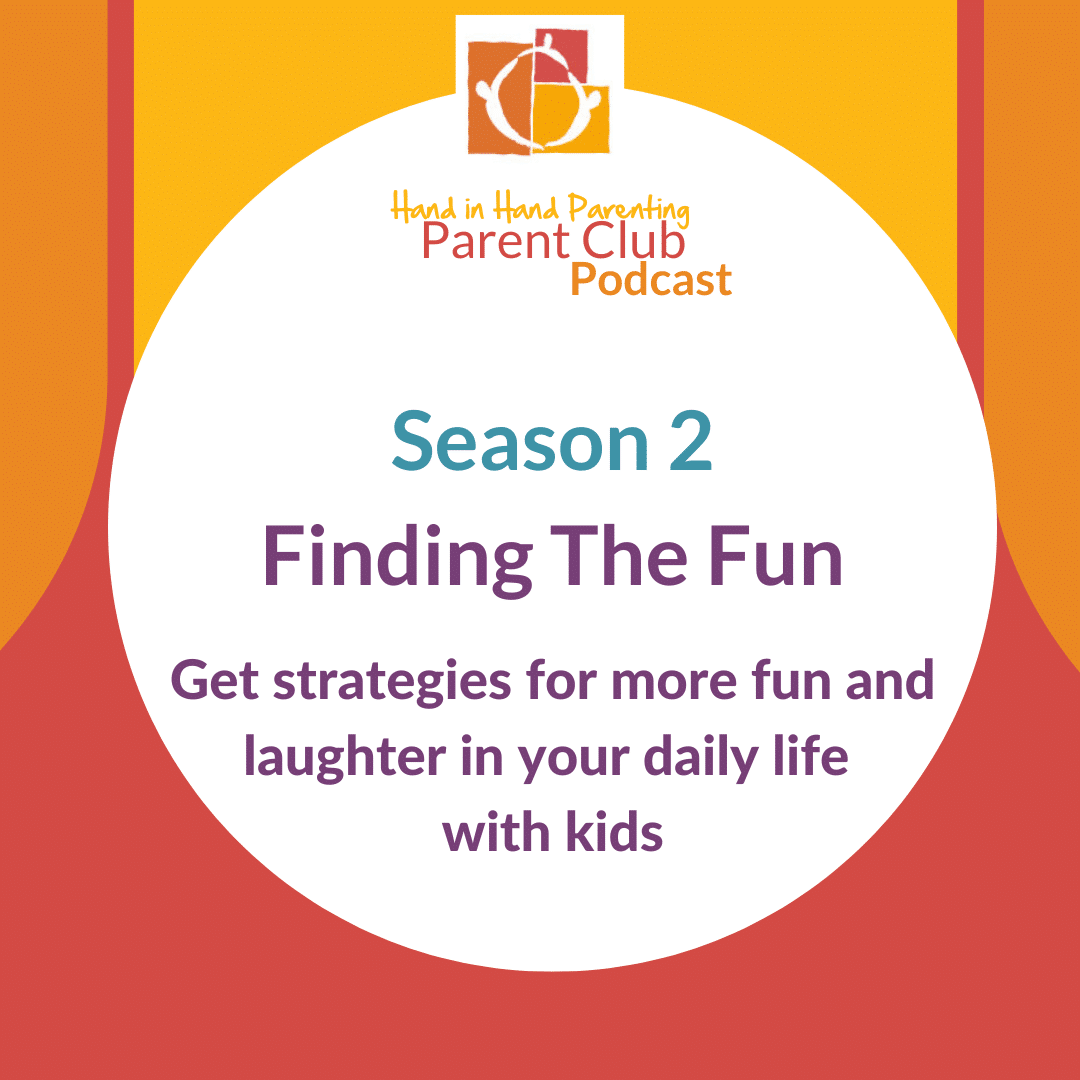Episode Transcript
Speaker 0 00:00:01 Welcome to the hand in hand parent club podcast. I'm Emily Murray, a hand in hand instructor and a mom of
Speaker 1 00:00:06 Two I'm Kathy Gordon, a single adoptive mom of a now young adult son, a hand in hand instructor. And we are both moderators of hand in hand's awesome membership program. The parent club,
Speaker 0 00:00:17 Every week, we'll be answering a parenting question. You'll hear about hand in hand. Parenting's powerful, respectful parenting tools. We'll share how they help you work with your child's feelings, especially when their behavior gets harder. Confusing.
Speaker 1 00:00:29 You can feel good about using these tools. They've brought warmth and connection to our own families and to many thousands of families around the world who are using the hand in hand approach.
Speaker 0 00:00:39 That's why hand in hand and the parent club exist. We're here to support you and your family. So you have more good, sweet fun times together.
Speaker 1 00:00:48 Hey everybody, our question this week is isn't there a way to stop tantrums and crying Emily?
Speaker 0 00:00:57 Well sort of <laugh> but we actually see tears and tantrums as helpful. Stay with us. Hang on. Let's explain. Uh, so sometimes it's helpful to have a picture in our minds when we are thinking about how feelings work. So the picture that we have for you today is to imagine that children store the fear, their feeling, actually all humans, us too. But for now we'll say children store their feelings. Like they would books in a backpack. So every time they have an experience where, um, they're scared or they're frustrated or they're angry or indignant, and they don't have a chance to express that somehow goes right in the backpack. So you can imagine that over time that backpack can get kind of heavy. And so every time we listen, um, to their tears, every time we get some good hearty laughter going or some good sweaty play going, they're unpacking from their emotional backpack.
Speaker 0 00:02:14 So they take it out, they put it down. And so when they put that emotional backpack back on after they've had a chance to, to, um, unpack some of that, they're carrying less with them. They can be more flexible, they can be more agile. Um, it's not such a heavy burden for them. Or the other example, analogy we can give you is, um, hurts are kind of like a scrape. You know, when you like you're on the tar and you skin, your knees, and in that scrape there's little bits of stuff that you have to rinse out. So an emotional hurt is the same way in our emotional system. A lot of little gravelly bits can get in there and, um, a big cry or a big laugh can rinse those gravelly bits out. So, um, the, the lovely thing is, is that anytime we have a big cry or a big hurt, we're rinsing everything out. We don't really even have to know what we're rinsing. It's just getting rinse. So what we're really going for when we're thinking about how to stop tantrums and crying is really more about how to use that natural healing ability. Well, when hurts are happening and to get ahead of tantrums and crying. So we're helping kids unload their backpacks and rinse out their emotional systems before they have to signal that it's too heavy or that something's uncomfortable.
Speaker 1 00:03:40 Yeah. So we thought we'd share with you a kind of a commonplace example. So a little little kid goes down the slide, they go too fast. They go, Hm, they hit their bottom or maybe their elbow, or even the back of their head because of this natural healing process. There's this pause where they look for their person because having your person there helps with the feelings getting up and out and helps with the healing. So they see their person and then they start to wa and this child that is allowed to cry hard for a few minutes, because you know, to get out that, that little bit of fear, that little bit of hurt that went in there when they went too fast and smacked their bum. You know, that, that that's the child that if, if they're just allowed to cry without being shame or shushed or distracted or overwhelmed by the parents' own panic, that's the child that they have that nice little good cry and then kind of he a big side.
Speaker 1 00:04:45 And they often go right back up on the slide and we all say, oh, children are so resilient, but here let's take the same scenario where they go down the slide too fast, boom, hit their bottom, their elbow, the back of their head. They, they look for their person. They start to wa but they're shamed. Oh, big boys don't cry or, you know, dis or, um, or distracted, oh, here have a cookie or shushed. You're okay. You're okay. You're okay. Or overwhelmed by the parents' panic. Oh no, no. Their blood, you know, then that child, they, they, they don't get the chance to cry. They tamp down the feelings. But because that little bit of fear, a little bit of hurt is still in there. Like Emily was talking about, like in their emotional backpack, they, they might get clingy. They don't wanna go back up on the slide, but here's the, here's the deal because we have this natural healing process.
Speaker 1 00:05:45 And as Emily said, it's like gravel, or I, I think of it like a pebble in your shoe, like you're walking around with a pebble in your shoe. You just, yet you gotta figure out how to get this pebble outta your shoe. You know? Um, they, they, they look for a reason to get that little bit of hurt that pebble in their shoe up and out. And so, you know, it's lunchtime and they ask for a second cookie, well, there's never a second cookie with lunch. And you're like, you know, what's the deal. There's no, you know, there's only one cookie and they have a full blown tantrum because they, you say no to a second cookie or it's time to leave the park. And usually they're pretty good about, you know, okay. Time to go. But this time they, no, and they throw themselves down on the ground.
Speaker 1 00:06:30 That's where, because their, their limbic system, their natural healing system, which we all have is looking for an excuse, an opportunity to get that feeling up and out. So as Emily said, when we get ahead of it in the way of like welcoming those tears, you know, then, um, we, you often get the child who's willing to go right back up on the slide and how it might happen at your house. You know, you know, your toddlers, you don't have a slide at your house, but, um, it might look like, you know, they, they get upset about something during the day and you, um, let them have a good, hard cry. Well, bedtime might go a little bit more easily or teeth brushing might go a little bit more easily be that same resiliency of going right back up on the slide. You'll see. On the other side of those, that tier those tears and tantrums,
Speaker 0 00:07:27 You know, I, um, uh, I, I remember when I really understood how this worked and the, the piece that stuck with me actually was, wait a minute. Tantrums can happen at times that are more convenient for me. And so I, when I got in the habit of not stopping the feelings when they were bubbling up, um, especially during times when I felt like I had the, the bandwidth for listening, I like I had the time or the bandwidth for listening. Um, I, by listening in those moments, as the feelings are bubbling, I just prevented a whole lot of difficulty, um, with the next transition, with the next, um, you know, whatever was next on our agenda for the day. Um, but I really had to work hard to not fix it or talk it away or, um, offer solutions. Gosh, especially as they get older. Um, I know with, with my teen, um, it's hard to tell sometimes when I should be stay listening and when I should be offering, you know, my ideas, my opinions, the answer is rarely does she actually need my ideas or opinions because I get in her way of her own good thinking and, and her own good emotional processing.
Speaker 1 00:08:44 Yeah. And that's true. Sometimes we can get in the way. Um, I mean, you know, when my son was in preschool, uh, particularly his second year of preschool when we went, like we went from the first year was like just two mornings a week, cuz it was a, um, just a half day preschool. And then the second year we went to five mornings a week and added pre-K and um, he started to really struggle at school and sort of, kind of start to whirl out of control. And um, and also I'm being a single parent. I got, uh, government funding for daycare. So I was then taking, picking him up from preschool and taking him to daycare, which he'd have a huge tantrum about. And I, you know, I didn't have hand in hand yet and I didn't understand what his feelings, what he was trying to tell me with these big feelings.
Speaker 1 00:09:40 Um, so I just thought, you know, get with the program and the, the treat teachers were well-meaning and the daycare person was well-meaning and we tried to do all kinds of like, you know, making a picture calendar for him of what, what, what to expect. And, um, I mean, E eventually it ended up that, um, you know, along this line of like looking for external solutions, um, we cut back to two mornings, a week of preschool and I stayed with him. So I didn't understand that if I had listened to the feelings when he was working on actually separation and if I had stay listened to his feelings, um, and still, you know, he might have been able to do five mornings a week, or he might have been able to go from, do that transition from preschool to daycare. But, um, I did external trying to, you know, fix the problem instead of listening to his feelings when really what he needed was just some really good, hard cries. Um, so it
Speaker 0 00:10:48 Can be so hard to know sometimes as a parent, like what, what do you need, what do you really need here? Um, I, I mean, a previous episode we were talking about, you know, some of the, some of our responses might be offering just a little bit more information. Um, but you know, when you offer the information and they're still tight or they're still upset, um, that's a pretty good signal that what they really need is a big dose of connection and a big cry possibly, or big laugh. So, you know, this week, your one small thing that you can try is just look for those little opportunities where feelings are already happening. Feelings are coming up and out and just listen without interrupting for even just five minutes and see what happens. See if they get to the other side of that hurt. And we have that big heaving sigh, or maybe they just, you know, come out of it and go on to the next thing, um, on their own, but give it a try, see what happens.
Speaker 1 00:11:47 And next week we're gonna tell you like, exactly what to say, say during this stay listening, what, because we can think like, what should I be doing? What should I be saying? So come back and, and tune in next week. We're gonna talk about what do I do? What do I say while I'm stay listening? Bye-bye
Speaker 0 00:12:08 Thank you so much for tuning into the hand in hand parent club podcast, please like, and subscribe to hear more and to connect with us between these episodes. Come on over to hand in hand parenting.org to join the parent club where you can get coaching classes and live support.
Speaker 1 00:12:21 Come join our vibrant community of parents in the parent club who are committed to getting the support. They need to be the parents they wanna become. We'd be honored to support you too. This podcast and the parent club are part of hand in hand parenting, a nonprofit organization that supports parents all over the world. We are here for you when parenting gets hard.


